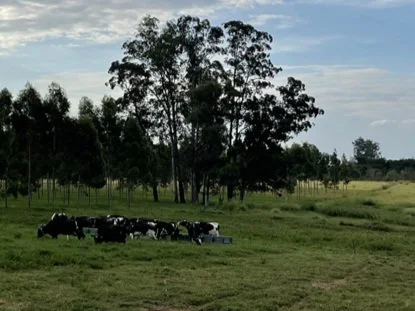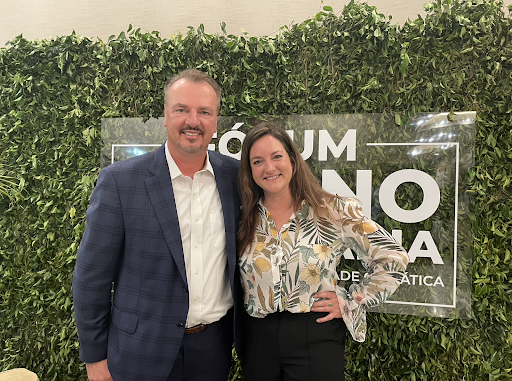Reaching Food Influencers with Food Justice Message
I spent the first week of May touring Brazil, visiting the Sao Paulo state research site where they’re testing feed additives to reduce methane emissions, and then to Embrapa where I saw silvopature experiments and a robotic dairy milking system with cows who are free to graze on pasture (pictured), be milked when they need it, and are part of a rotational grazing system.
I then toured the JBS leather plant, plastics recycling plant where they’re turning used plastics from their company into new products, the JBS soap facility, biodiesel plant, and incredibly impressive packing plant. I then attended their conference on methane and listened to researchers speak about additives like tannins which can reduce methane emissions.
Overall, I was so impressed with how thoughtful, positive, and receptive they were to optimizing the industry to meet the global demand for meat.
I also learned a lot more about the complex issues with the claims that beef is “destroying the amazon rainforest.” I let them know that from the American consumer point of view, the number one image that comes to mind when we hear about beef from Brazil is “burning rainforest”. However, the reality of the situation is far more nuanced than what the US media portrays.
Territorial Emissions
During a dinner in Brazil, while talking with Frank Mitloehner from UC Davis, I learned about the concept of Territorial Emissions. This essentially means that the country which produces the emissions is burdened with the full brunt of the GHG blow.
So, in the case of Ireland, because they produce so much beef and dairy, they have a GHG “score” much worse than the countries which import their meat, allowing them to look more “carbon neutral”. So as pressure mounts to have Ireland reduce their emissions, many Irish farmers will be out of business.
The problem is, meat and dairy demand will not decrease, so the business will simply move to other countries like Australia and Brazil to supply the EU with meat. I’ve scheduled time to record a podcast with Frank to discuss this unfair and illogical policy further, and will share the link once it’s live.
I also got to visit Swift, a store selling only frozen meats, which is very different from how Americans typically buy our meat. I was particularly excited to see the ground “crumbles” which I think could sell really well here. You can “shake” these pieces of ground meat right into a sauce or chili very easily. Currently, the only ground frozen option is a full one pound brick which thaws into a soggy and sometimes leaky mess. This way you could use just what you need and keep the rest in the freezer. I hope to see this type of product in US freezer cases soon.
I want to thank the friendly and generous team at JBS and Silvopasture for hosting me and I look forward to working more with them in the future. Just a few short days after returning from Brazil, I flew to Kansas City for the Animal Ag Alliance conference. My favorite part of the conference, other than a most entertaining visit to a steakhouse with Rob Williams and Doug McNicholl from Meat and Livestock Australia, was the interactive session where we had to come up with a plan of action for a vegan protest on a farm. We were given a real scenario of on-site protestors and social media harassment which included tagging major customers and groups were challenged with, “What three things would you do first?”
To be honest, the first thought that crossed my mind was “I hope I never have to deal with this!”. I heard from producers who have faced this issue in real life and learned the importance of all farmers to come up with an action plan. All of the speakers at the stakeholders summit were top notch and the organization was smooth and thoughtful. Great job!
Currently, I’m in the UK. My tour begins with a visit to Knepp Castle Estate, where a massive and successful “wilding” project is underway. If you haven’t read it, I highly recommend the book “Wilding” by Isabella Tree (and if you have the chance, try listening to it because her voice is wonderful!). I then present at the Health Optimization Summit in London, followed by a visit to Patrick Holden’s dairy farm for a joint event with Meat Promotion Wales. I’ll be sharing a review of what I saw and learned while there.
It’s fascinating to see how the anti-meat narrative impacts countries around the world differently. From vegan lunches in New York City public schools, to livestock farmers going out of business because of short sighted policies to reduce emissions, we all need to continue to push back harder than ever.
Diana Rodgers, RD




